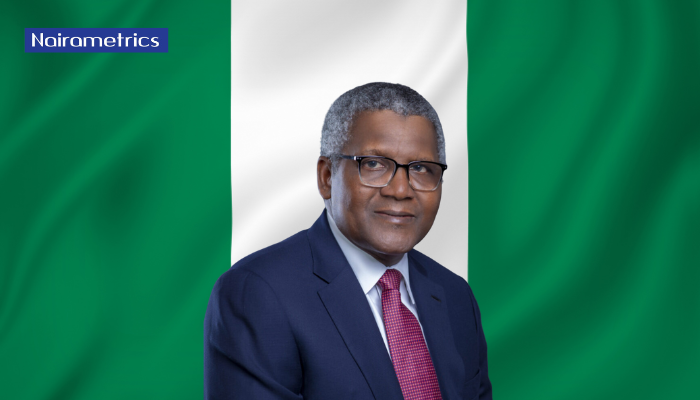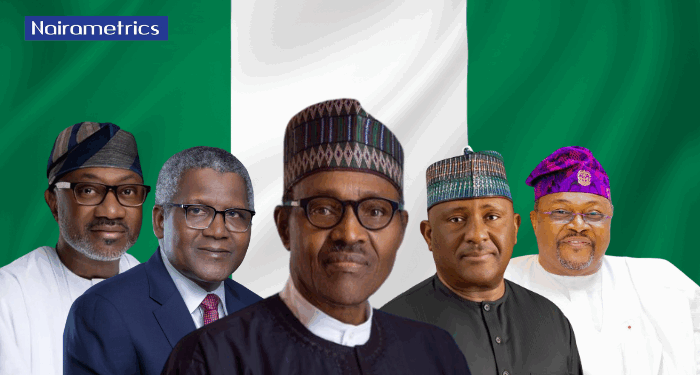The passing of former Nigerian President Muhammadu Buhari sparked a wave of reflection across the nation.
As citizens weigh the impact of his eight-year administration (2015–2023), opinions vary widely on the economic legacy he left behind.
While many reports have chronicled the economic turbulence of two recessions, inflation spikes, and a volatile naira that defined much of the Buhari era, it is also important to examine how Nigeria’s wealthiest individuals navigated these stormy waters.
Despite widespread economic hardship, some billionaires not only stayed afloat but expanded their empires, while others faced setbacks due to shifting policies, regulatory crackdowns, and an uncertain investment climate.
In this piece, Nairametrics explores how Nigeria’s top billionaires (in dollar terms)performed during the Buhari administration. We examine their net worth trajectories, business growth (or decline), the industries they dominate, and how key government policies affected their standing in the country’s socio-economic landscape.

Net Worth Before Buhari: $22 billion
Net Worth After Buhari: $14.2 billion
Aliko Dangote, Africa’s richest man and founder of the Dangote Group, experienced a mix of significant business expansion, policy-related headwinds, and economic volatility, all of which shaped the trajectory of his vast empire.
Here’s a breakdown of how Dangote fared during Buhari’s administration:
Growth and Expansion
- Dangote Refinery Project
The highlight of Dangote’s ambitions, the Dangote Petroleum Refinery, was largely built under Buhari’s tenure. Though inaugurated just days before Buhari left office in May 2023, the massive $19 billion facility in Lagos became a centrepiece of Nigeria’s industrial narrative under his administration. It was hailed as a potential game-changer in reducing Nigeria’s reliance on imported refined petroleum products. - Manufacturing & Cement Boom:
Dangote Cement, the group’s flagship, expanded operations across Africa during this period. Despite foreign exchange restrictions and inflation, the company consistently posted strong revenues, driven by regional demand and strategic capacity expansions. - Diversification Strategy:
Dangote also broadened his footprint into fertilizer, with the commissioning of the Dangote Fertilizer Plant in 2022, one of Africa’s largest. This bolstered Nigeria’s local production capacity and earned Dangote significant praise from Buhari’s government as a national industrialist.
Challenges and Economic Pressures
- Forex Shortages & Naira Volatility:
Nigeria’s foreign exchange crisis worsened by falling oil prices, capital flight, and multiple exchange rate regimes created operational challenges. Import-dependent segments of Dangote’s business, especially in equipment and construction, faced cost pressures.
- Border Closures (2019–2020):
Buhari’s controversial land border closures aimed at curbing smuggling had mixed effects. While local manufacturers like Dangote’s flour and cement businesses benefited from reduced foreign competition, it also disrupted supply chains and trade across West Africa.
- Inflation and Purchasing Power:
Consumer-facing businesses within the Dangote Group had to adjust pricing models due to rising inflation, especially in 2020–2022. Still, the group’s dominance allowed it to maintain market share in key sectors.
- Networth Fluctuations
February 2015: Estimated at around $22 billion, according to Forbes. But closed at around $17 billion by Dec 2015.
2019-2020 Pandemic Dip: Fell to around $8 to 9 billion due to global market contractions and naira devaluation.
2022–2023 Recovery: Rebounded to $14.2 billion, supported by strong performance in cement and the nearing completion of the refinery.
Final analysis: Net loser














Using exchange rates N200/ dollar in 2015 and N 465/ dollar in 2023, the billionaires lost in dollar terms, but gained in Naira terms.
But the stock market gained both in Naira terms.
This means “poorer” billionaires and richer rest of the investors.
This implies better wealth spread, and probably an expansion of the wealth class and maybe the middle class.
This probably explains why aviation flights and vehicle registrations hit an all time high by 2022.
More people could afford this
Note: Buhari is dead. Let’s reduce the biases now and try and keep the analysis honest and facts based. No more political, ethnic or religious scores to gain.
Did you notice that the business that has made Dangote double his wealth in 2024 was built between 2017 and 2023? Under Buhari? With immense FG support in cash, policies etc?
That’s a true wealth building legacy